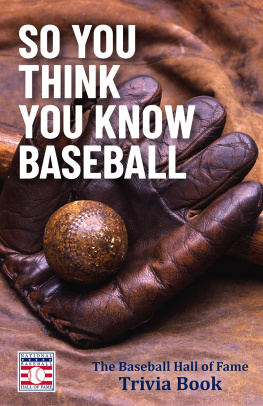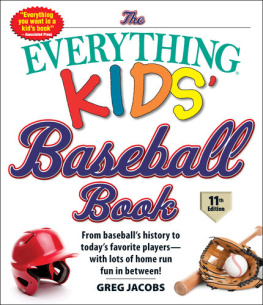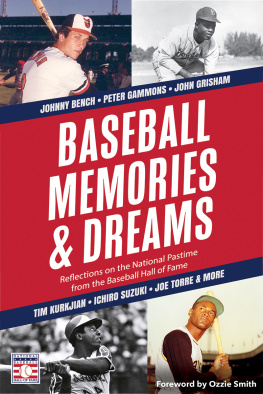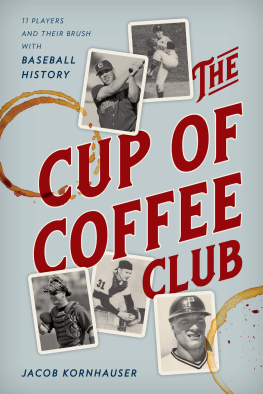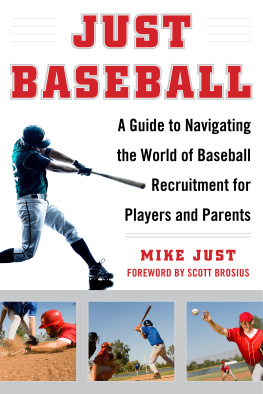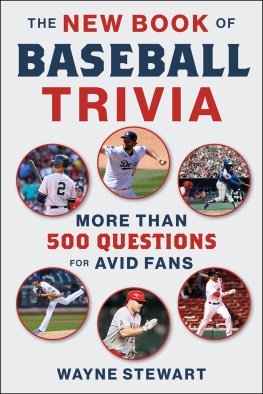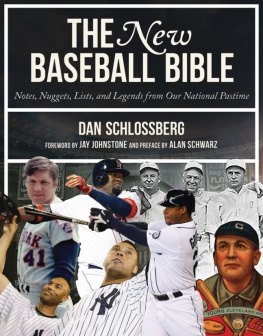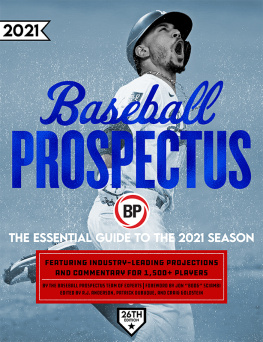Title Page
101 THINGS YOU MAY NOT HAVE KNOWN ABOUT BASEBALL
By
John D. T. White
Publisher Information
Apex Publishing Ltd
PO Box 7086, Clacton on Sea, Essex, CO15 5WN, England
www.apexpublishing.co.uk
Digital version converted and published in 2012 by
Andrews UK Limited
www.andrewsuk.com
Copyright 2011 by John D. T. White
The author has asserted his moral rights
All rights reserved. This book is sold subject to the condition, that no part of this book is to be reproduced, in any shape or form. Or by way of trade, stored in a retrieval system or transmitted in any form or by any means, electronic, mechanical, photocopying, recording, be lent, re-sold, hired out or otherwise circulated in any form of binding or cover other than that in which it is published and without a similar condition, including this condition being imposed on the subsequent purchaser, without prior permission of the copyright holder.
Dedication
I wish to dedicate my book to my two sons, Marc and Paul.
With Love From
Your Dad
Acknowledgments
I would like to thank Michael Aubrecht, Editor of The Pinstripe Press for his fantastic Foreword to my book and for his valued help. And thanks also to Martin Dempsey for his brilliant cover design.
John
Foreword
It is considered Americas National Pastime, but over the last century, baseballs impact has grown well beyond the borders of the United States. Far more than just a mere sporting event, it has become a major ingredient of many cultures, and has often been responsible for bridging the gap between nations, enabling the poor to escape poverty and bringing people together in times of crisis. During war, following a natural disaster, or in the midst of economic hardship, the game has always provided an emotional escape for people from every race, religion and background who can collectively find solace at the ballpark. Therefore, it somehow seems fitting that the origins of modern baseball can be traced back to a divided America when the country was in the midst of a great Civil War.
Although baseball, originally referred to as Town Ball, was somewhat popular in larger communities on both sides of the Mason Dixon line, it did not achieve widespread popularity until after the war had started in 1861. The mass concentration of young men in army camps and prisons eventually converted the sport formerly reserved for gentlemen into a recreational pastime that could be enjoyed by people from all backgrounds. For instance, both officers and enlisted men played side by side. Soldiers earned their places on the team because of their athletic talents and not their military rank or social standing. Union and Confederate officers endorsed baseball as a much needed morale builder that also provided physical conditioning. After long details at camp, it eased the boredom and created team spirit among the men. Often, the teamwork displayed on the baseball diamond often translated into teamwork on the battlefield.
It has been disputed for decades whether Union General Abner Doubleday was in fact the father of the game. Many baseball historians still reject the notion that Doubleday designed the first baseball diamond and drew up the modern rules. Nothing in his personal writings corroborates this story, which was originally put forth by an elderly Civil War veteran, Abner Graves, who served under him. Still, the city of Cooperstown, NY dedicated Doubleday Field in 1920 as the official birthplace of organized baseball. Later Cooperstown became the home of the National Baseball Hall of Fame.
A report published in 1908 by the Spalding Commission (appointed to research the origin of baseball) credited Union General Abner Doubleday with being the father of the modern game. It stated, Baseball was invented in 1839 at Cooperstown, NY by Abner Doubleday-afterward General Doubleday, a hero of the battle of Gettysburg-and the foundation of this invention was an American childrens game called One Old Cat.
Regardless of the debate over the games inventor, historians have all agreed that no other contest has ever had an impact on society as that of baseball, and that it has always been more than just a game. As John S. Bowman and Joel Zoss stated in The Pictorial History of Baseball, As part of the fabric of American culture, baseball is the common social ground between strangers, a world of possibilities and of chance, where its never over till its over. It is an American tradition rich in legends, folklore and history, a never-ending story where every game is a new nine-inning chapter and every player has the chance to be the hero.
In 1866, Charles A. Peverelly wrote, The game of baseball has now become beyond question the leading feature of the outdoor sports of the United States ... It is a game which is peculiarly suited to the American temperament and disposition; ... in short, the pastime suits the people, and the people suit the pastime. This still rings true today.
Over the years some rules have been modified. The postseason structure has changed. Special games (such as the World Series and All-Star events) and global tourneys (such as the World Baseball Classic) have been added to the mix. But overall, the game itself has remained the same; pitch the ball, hit the ball, catch the ball. It is a simple and sweet science that has remained timeless. In essence, baseball remains as one of the few guarantees in life. Year after year - season after season - fans of all ages can revel in the past, and look to the future.
One issue that constantly comes up is the challenge over who was the greatest Major League Baseball team of all-time. Some say it was the 1906 Chicago Cubs, who won 116 games. Others say the 1929 Philadelphia As, who showcased one of the best pitching staffs ever to share a mound. Maybe the 1975 Cincinnati Reds, featuring The Big Red Machine, or even the 1902 Pittsburgh Pirates, who won the National League crown by 27 games, the widest margin of victory in league history. The 1912 Boston Red Sox, the 1942 St. Louis Cardinals, the 1927, 1939, 1961 and 1998 New York Yankees, the 1970 Baltimore Orioles, the 1986 New York Mets, the 1995 Cleveland Indians and many others have all been considered worthy of this honor. All have been heavily defended (most by their hometown fans) as the greatest teams in the history of baseball. It is the stories of these giants on the diamond that are passed down from generation to generation. All of them are right - in their own right.
Todays modern era has witnessed a tremendous expansion that has stretched well beyond the confines of the United States. Lineup cards are filled with players of many different nationalities and many of their native countries have adopted the game as their own. From South America to Asia and beyond, baseball has become an International Pastime that is enjoyed by people of every nation and race. Regardless of differences in politics or religion, the distance between first and third base is always 127 feet. You can count on that.
Baseball has ALWAYS been there - and will ALWAYS be there. It is a constant. And the official countdown to next years spring training begins immediately after the last pitch of the World Series, when we cant wait to hear those two magic words again... Play Ball!
Michael Aubrecht
Pinstripe Press/Baseball-Almanac.com
March 2012
101 Things You May Not Have Known About Baseball
1. NAME CHANGE
Al Simmons (Philadelphia Athletics 1924-32, 1940-41 & 1944, Chicago White Sox 1933-35, Detroit Tigers 1936, Washington Senators 1937-38, Boston Bees 1939, Cincinnati Reds 1939 and the Boston Red Sox 1943) was one of baseballs greatest right-handed sluggers who won two batting titles with averages of .381 (1930) and .390 (1931), 307 home runs and recorded 11 consecutive seasons as a .300 hitter and 100-RBI man. Simmons, who was born Aloysius Harry Szymanski changed his name to Al Simmons when he read an advertisement for a hardware store in a newspaper. In 1953, he was elected to Baseballs Hall of Fame and ended his career with a batting average of .334.
Next page

